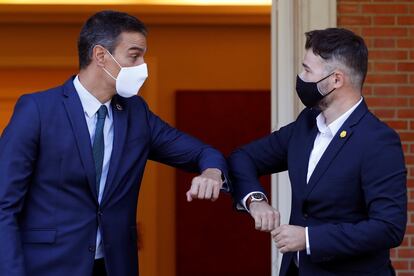Spanish Congress approves new budget, ending years of gridlock
The victory brings added stability to the minority government and powers an ultra-expansive spending plan to deal with the coronavirus crisis

Spain’s minority government has secured congressional support for its 2021 spending plan, ending years of budget gridlock and improving its own political prospects inside a fractured parliament.
On Thursday the lower house of parliament approved the spending blueprint with 188 votes in favor and 154 against. The bill will now go to the Senate, where any amendments will be voted on by Congress in late December.
The governing coalition headed by the Socialist Party (PSOE) with junior partner Unidas Podemos has underscored that the new budget includes much greater social spending to address the coronavirus fallout. It will also channel millions of euros in funds from the European Union to help with the recovery in one of the world’s hardest-hit economies. The new spending plan also allocates more funds to education and to caregiving for dependent people.
Spain had been rolling over the 2018 budget, which was drafted by the previous administration of Mariano Rajoy of the Popular Party (PP) and did not make provisions for dealing with unexpected events such as this year’s coronavirus pandemic.

The government’s blueprint was backed by several regional parties, including the separatist groups Catalan Republican Left (ERC) and the Democratic Party of Catalonia (PdeCAT), as well as EH-Bildu, a radical Basque party that has courted controversy in the past for failing to condemn the violent campaign waged by the now-defunct terrorist group ETA.
This fact has drawn significant criticism in recent weeks from the political right and from the liberal Ciudadanos (Citizens), which voted against the budget on Thursday after initially attempting to reach a separate deal with the government. “The PSOE has lost its soul,” said Edmundo Bal, the deputy spokesperson for the party, ahead of the vote.
Detractors of the bill, which also include the main opposition PP and the far-right Vox – the third-largest force in Congress – said they additionally oppose its tax hikes and higher deficit provisions. But supporters hailed it as “the end of neoliberal austerity.”
“This budget inaugurates a new political period in Spain and a new parliamentary majority, one of dialogue, one that looks to the future, with 11 different parties representing more than 12 million Spaniards, one that leaves the fuming trio of the Colón photograph on the sidelines,” said Unidas Podemos spokesperson Pablo Echenique, alluding to to a picture of an anti-government march showing representatives of Ciudadanos, Vox and the PP standing together in February 2019. Echenique also warned detractors that the budget is just “a taste” of the laws that will be passed from now on.
Spain held a snap election in April of last year after a fractured parliament voted down an earlier draft of the budget, and this was followed by another general election in November, which also failed to deliver a clear winner. Prime Minister Pedro Sánchez of the PSOE now heads a minority government that is forced to reach case-by-case deals in order to get legislation passed. Sánchez, who managed to iron out earlier friction with his own Podemos partners over the terms of the budget, is hoping that this victory will see him through the remainder of the political term.
English version by Susana Urra.
Tu suscripción se está usando en otro dispositivo
¿Quieres añadir otro usuario a tu suscripción?
Si continúas leyendo en este dispositivo, no se podrá leer en el otro.
FlechaTu suscripción se está usando en otro dispositivo y solo puedes acceder a EL PAÍS desde un dispositivo a la vez.
Si quieres compartir tu cuenta, cambia tu suscripción a la modalidad Premium, así podrás añadir otro usuario. Cada uno accederá con su propia cuenta de email, lo que os permitirá personalizar vuestra experiencia en EL PAÍS.
¿Tienes una suscripción de empresa? Accede aquí para contratar más cuentas.
En el caso de no saber quién está usando tu cuenta, te recomendamos cambiar tu contraseña aquí.
Si decides continuar compartiendo tu cuenta, este mensaje se mostrará en tu dispositivo y en el de la otra persona que está usando tu cuenta de forma indefinida, afectando a tu experiencia de lectura. Puedes consultar aquí los términos y condiciones de la suscripción digital.








































